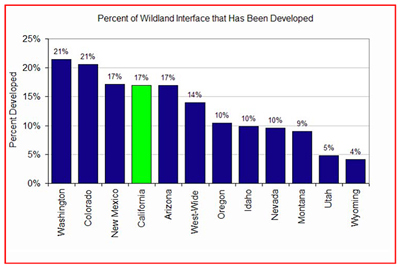
 |
|
|
Today, there are 1 billion acres of government (federal, state and local) and privately owned wildlands, and another 220 million acres (twice the area of California) that have been designated as high-risk for WUI fire. Those 220 million acres of WUI are overlaid with more than 70,000 communities, 46 million single-family homes, several hundred thousand businesses, and an estimated population of more than 120 million.
Since 1990, the conversion-growth rate of wildlands to wildland urban interface has reached unprecedented levels in the U.S. at an average of two million acres per year, 4,000 acres per day and three acres per minute. Recent research indicates that in the western U.S., about 14 percent of the available WUI lands have been developed and 86 percent remain available for development. Nationally, estimated projections show that about 30 percent of WUI acreage has been developed with 70 percent available for future development.
The statistics tell the story: Despite the fast-growing number of WUI areas throughout the U.S., study after study shows that rural areas lack proper building, fire and WUI codes; only 10 percent of WUI communities have adopted a Community Wildfire Protection Plan (CWPP); and only one percent (about 700) of WUI communities currently implement wildfire prevention programs like firewise, firesafe, firefree, and fireready.
In 2008, the Code Council spearheaded the first National Blue Ribbon Panel review of wildland urban interface problems, and just last year ICC established and sponsored the development of the National Wildland Urban Interface Council. ICC has become a recognized world leader on the Wildland Urban Interface Fire battleground by serving on the United Nations International Wildland Fire Alliance, working with key members of the U.S. Congress to better understand the growing problem, and continuing to promote the adoption and enforcement of the IWUIC around the globe.